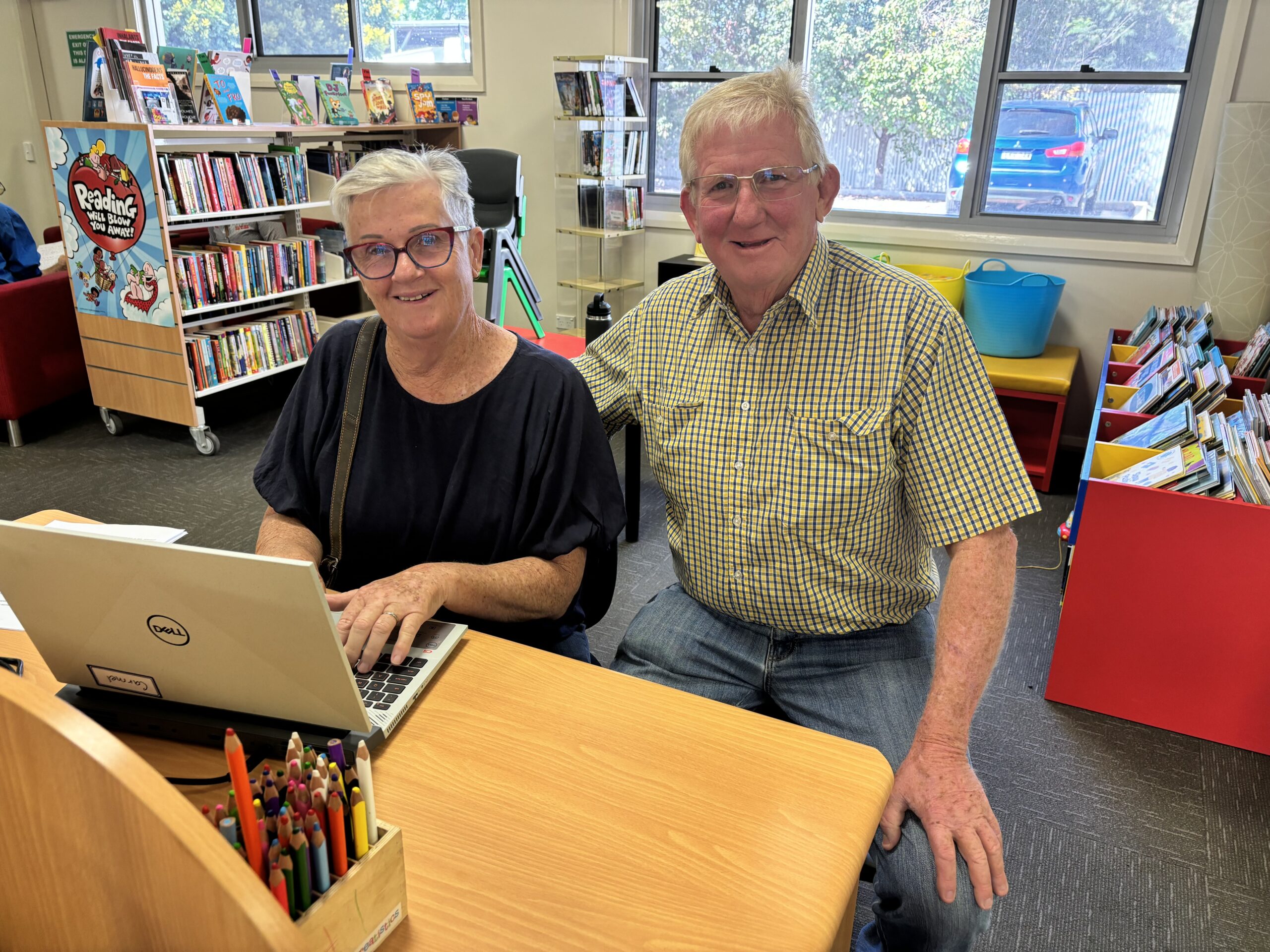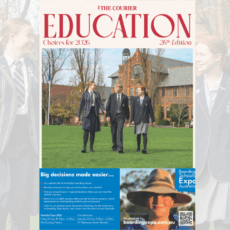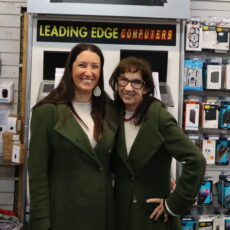During a submission writing workshop, Terry Melton told The Courier he was willing to speak publicly about his negative experience to make a positive difference.
Mr Melton’s submission was one of several in support the ‘Save Our Wee Waa Hospital’ campaign’s crusade to restore the town’s health service including 24-hour operation and patient access to an onsite doctor.
“The system isn’t just broken, it’s collapsed,” said Mr Melton.
The Wee Waarian, who has suffered eight strokes explained his ill-health was only made worse by a lack of appropriate and adequate care and treatment.
“If I didn’t know any better, I would have thought they were trying to kill me,” Mr Melton said.
“I went to the hospital for help. I didn’t feel safe.”
Mr Melton said he endured misdiagnosis, received the incorrect medication and lacked adequate support resulting in a devastating blow to not only his mental health but also his wife Jenny’s.
“The after effect of this ordeal is ongoing, not only for me, but for my wife,” writes Mr Melton in his submission. “After four years of dealing with these serious issues she had been diagnosed with PTSD. Her treatment is ongoing and has severely affected her overall health.” Mr Melton added, “It has taken four years to get to a point where I could write this story, such is the psychological and emotional battle it has been.”
The Meltons highlighted the burden carried by the families and friends of country patients, including the time and distance it takes to travel to receive treatment or to support your loved one. As well as the pressures and costs of being away from home and taking leave from work and other commitments.
“The ongoing effects of the treatment or lack thereof by HNEH is that I have no faith in the system that is HNEH,” said Mr Melton.
“My biggest issue with HNEH is the quality of locum doctors being employed in the system. On three occasions I was subjected to locum doctors out of their depth. Misdiagnosis from these doctors could have killed me or left me seriously incapacitated. It was only good luck that these strokes did not entail blood clots.”
The Meltons thanked the staff and off-duty health professionals who assisted them. “I had no issue with most of the medical staff as I saw firsthand how understaffed and ill-staffed they were,” writes Mr Melton.
He also wanted to empower people to be aware of their own health and ask questions.
“Some good advice I was given is – make sure you know what tablets you’re taking.”
The Meltons said leaning on each other, a good sense of humour and their family, especially their grandchildren, have provided them with laughter and light during this dark and incredibly difficult time.
“One of them calls Terry ‘Garfield’ because they think he’s got nine lives like a cat,” added Mrs Melton, whose support for her husband has been unwavering. “We don’t sleep well, always thinking what’s going to happen next,” she added.
“I’ve worked hard my whole life,” said Mr Melton who owns and operates a spraying business.
“I’ve had to learn to prioritise and re-evaluate things. I am a different person now; it’s had a huge impact on me. My family comes first.
“And I need that hospital open, the community needs that hospital open.
“I’m 60 per cent more likely to have another stroke, I definitely need that hospital to be open.”
Below is a copy of Terry Melton’s submission, shared with The Courier:
My Health at Hunter New England Health. Stroke One 18.4.20 – 3.30 am I presented to Wee Waa Hospital after suffering a major stroke. The locum doctor took one hour to arrive at the hospital, only coming one hundred metres from his quarters on the grounds. He appeared to be completely out of his depth. The nurse on duty had several arguments with him about stroke procedure and she rang the ambulance to take me to Tamworth. The doctor attempted to cannulate me on the stroke arm with a small cannula. The nurse forcibly intervened and put a larger cannula in the right, non-stroke side. After the arrival of the ambulance, the doctor argued with them about taking me. Eventually, they loaded me up and hightailed to Tamworth, arriving just inside the 4.5-hour window to administer the drug to dissolve blood clots from the onset of the stroke. On arrival in Tamworth, the doctor that saw me in the emergency department was convinced that the stroke was caused by Atrial Fibrillation. I was being treated for A.F. against my better judgement as I have never had symptoms of A.F. I was never seen by a neurologist. When I had strokes two and three, I was wearing a heart monitor and it failed to pick up any irregularities in my heart. The strokes were clearly not atrial fibrillation related. Incorrect medication was given at rehab.
Stroke Two. 12.06.20
No issues here. I was transported to Moree where scans showed no blockage. It did however take over a day to get me to Tamworth to the stoke unit.
The air ambulance service is another issue. After being in twenty-six ambulances and on six flights … 80 per cent of these trips were hassle free, the other 20 per cent were a nightmare.
Stroke Three 15.06.20
A third stroke happened in the Tamworth Hospital Stroke Unit. While the stroke team were trying to organise a plane for me to go to Newcastle, Hunter New England Health demanded to send me by road. While that battle was going back and forth, I experienced a further stroke in the ward. Another bigger stroke. Fortunately, a retired paramedic was in the stroke ward, and noticing that I was not well, she hit the emergency button. I temporarily passed away but did come back on my own fruition. I was immediately airlifted to Newcastle Private Hospital and underwent carotid endarterectomy surgery on 17.06.20. This surgery revealed that I had an ulcer in the carotid artery that was in the early stages of rupturing.
Stroke Four 28.02.21
During a church service at Wee Waa, I was picked up by ambulance and transferred to Moree Hospital.
Stroke Five 28.02.21
En route to Moree Hospital via ambulance, I suffered another reasonably big stroke. My blood pressure and pulse crashed. On arrival at Moree, Emergency Department, the locum doctor on duty refused advice from the paramedics, saying I had not had any strokes, but that they were seizures. These paramedics had transferred me twice already with the same symptoms and a neurologist later confirmed they were strokes. The doctor dismissed the paramedics completely. I was put in an overflow room in Moree Emergency Department and fended for myself. The doctor completely ignored the fact that I had already experienced three strokes, one major, and that I had my carotid artery operated on and an ulcer removed from it. This is what caused the first three strokes.
After each of these strokes, I lost the use of parts of my left side. I generally recovered from most of the loss after several days with the more severe losses taking from 10 to 14 days to return to normal.
Stroke Six 28.02.21
Whilst in this overflow room, I suffered another stroke. A nurse came in towards the end of the stroke and I was not seen by the doctor at all. No observations were taken regularly before I was flown to Tamworth Hospital that night. On arrival at Tamworth Base, I waited in the ambulance bay for twenty-five minutes, then dumped in the foyer of the E.D. in Tamworth where I was left another ninety minutes. I was then placed again in an overflow room in Emergency and not seen by a doctor until the next afternoon and very infrequent observations were taken. A nurse came in and told my wife that I was having seizures, not strokes as she had had been an E. D. nurse for twenty-five years and knew the difference.
During the handover from Moree Base to Air Ambulance, then to Tamworth Base, the word seizures was continually used. I tried to correct them each time but was completely ignored.
Stroke Seven. 01.03.21
This occurred in the overflow room. My wife ran out into the ED and screamed for someone to come and help me. This was the first time I had seen a doctor in almost twenty four hours. No urgency was shown prior to the stroke because I had been pre-diagnosed with having seizures not strokes. After this stroke, (they realised they were strokes I was having, not seizures), a range of tests were done and on three occasions, young doctors came in with inconsistent results: my carotid artery was fourteen per cent, sixty per cent and seventy per cent blocked, all from the same scan!
Tuesday 02.03.21
A neurologist saw me and hit the panic button. All these alleged seizures were in fact strokes. She saw the results from the scan and said my carotid was ninety-five per cent blocked and immediately started to organise for me to go to Newcastle Private Hospital under the care of a vascular surgeon.
On the flight (a contractor) to Newcastle, the inflight nurse started asking me about my pending heart surgery as that is what her paperwork said. I informed her that I had several strokes. She had no paperwork on that. To this day, I don’t know whose paperwork she had. She told me that I should be lying down, but that wasn’t possible as the bed was taken up by a brain injury patient, so I had to sit through a very turbulent flight. On arriving at Maitland airport, there were two ambulances waiting. One for the brain injury patient and one for the heart attack patient. The paramedic rang Newcastle Private, and luckily, they had everything right. After talking to the private hospital, the ambulance pulled over and they laid me down.
Stroke Eight. 08.03.21
This occurred in Newcastle Private Hospital and a second surgery was done on my carotid artery. I passed away again momentarily, but like the first time, I came back under my own steam. There were no complications after this surgery.
After the Bypass. Double Bypass Surgery 06.02.24. This surgery was done in Newcastle Private Hospital with no complications. On returning home I developed Atrial Fibrillation which is common after a bypass. These episodes left me incapacitated. I was rushed to Narrabri Hospital as Wee Waa had no doctor and I refused to go there. During two of these episodes, the paramedics found me unresponsive and struggled to find any vital signs. My issue here is the fact that as Wee Waa had no doctor, I was forced to go to Narrabri. These were serious events and I was worried that one of these episodes was going to kill me. I went to Narrabri on five occasions in the ambulance: on 15.02.24, 18.02.24, 20.02.24, 22.02.24, and 24.02.24. The first four times, I was stabilised in the ED and went home the following day. I remained in the ED as no beds were available in the hospital. (Another issue here is the fact that my wife had to come some distance to pick me up.). On the fifth occasion, my wife said that I was not going home until it was sorted. After a few more episodes in hospital, my vascular surgeon and cardiologist were contacted concerning a plan of action. My wife told the cardiologist that she wanted me in Newcastle to sort the problem out. A plan was formed with medications for me but the staff were very busy (due to the overflow of patients from Wee Waa not having a doctor) and I was not given my medication regularly. One drug I was supposed to have every eight hours to control the heart, but I could go twelve hours or more between doses. At one stage I asked the nurse for my meds and was told she couldn’t give them to me as they were not charted. I told her I had all my own medications in the drawer. She told me to self-medicate. I did self-medicate and within twelve hours the frequency and strength of the episodes was reducing.
On one occasion, at about 1.30 a.m., my obs. were taken and my blood pressure was 103/66. I was assisted out of bed and made to walk around to get a better blood pressure reading. I objected and said you can’t do that as they need to know what’s going on. I informed the doctor of this, and he was not happy.
It took two days to get transferred to Newcastle because I was told that I wasn’t urgent, and then the next time they said that I was too unstable. Finally, a private contractor flew from Brisbane to Narrabri to pick me up and take me to Newcastle.
I had no issue with most of the medical staff as I saw firsthand how understaffed and ill-staffed they were. There always seemed to be elderly nurses at night time and in the E.D. They were run off their feet and totally exhausted. The doctor was the same. It didn’t seem to matter what time I presented to the E.D., the same doctor was still working.
As a patient in the ward, I observed several staff members who made an art form of doing nothing; walking up and down the corridor, talking to all and sundry, but doing nothing, while other nurses were doing their job.
The ongoing effects of the treatment or lack thereof by HNEH is that I have no faith in the system that is HNEH. I have my own action plan in place to go straight to Newcastle if any further issues arise.
The after effects of this ordeal is ongoing, not only for me, but for my wife also. After four years of dealing with these serious issues she had been diagnosed with PTSD. Her treatment is ongoing and has severely affected her overall health.
Between the carotid artery surgeries and after the second surgery, I needed psychological help to get me over the dramas I had encountered. I also had psychological help after the atrial fibrillation ordeal I went through. This help is ongoing as I have residual issues revolving around my treatment in the HNEH framework.
My biggest issue with HNEH is the quality of locum doctors being employed in the system. On three occasions I was subjected to locum doctors out of their depth. Misdiagnosis from these doctors could have killed me or left me seriously incapacitated. It was only good luck that these strokes did not entail blood clots.
I have formed the opinion that when being admitted to an emergency department, that in my experience, the doctor does not look any further than his field of expertise. A cardiologist only worries about your heart and as long has you don’t die or a heart related issue, he is satisfied, and the system is satisfied. This problem is probably killing people. I tell everyone, when being admitted to an emergency department, question everything and fight for your life because in the end, you might just save your own life.
To order photos from this page click here











